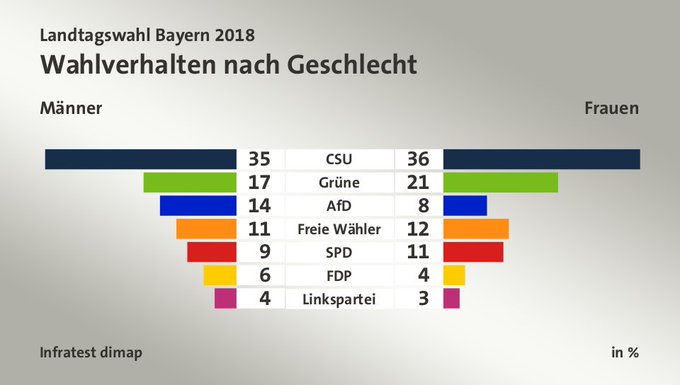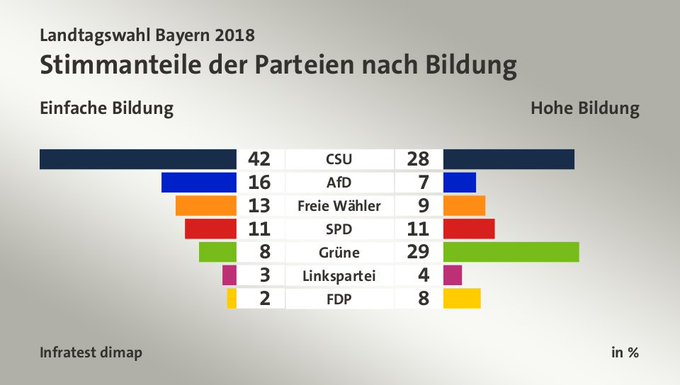"This
Is An Earthquake For Bavaria": CSU Suffers Stunning Defeat,
Loses Absolute Majority In Worst Result Since 1950
15
October, 2018
Voters
in Germany’s economically dominant southern state of Bavaria
delivered a stunning rebuke to the ruling Christian Social Union, in
an election that delivered another crushing blow for the parties in
Angela Merkel’s grand coalition in Berlin.
With
all eyes on Sunday's Bavaria election, moments ago the first exit
polls showed a historic collapse for the ruling CSU party, which has
ruled Bavaria continuously since 1957, and which saw its share of the
vote collapse from 47.7% in the 2013 election to just 35.5%, losing
its absolute majority and suffering its worst result since 1950, as
voters defected in their droves to the Greens and the far-right
Alternative for Germany.
German newspaper Welt
called the election "the
most painful election defeat of the past 50 years for the CSU". As
predicted in the polls, the CSU experienced a "historic debacle"
in the Bavarian state elections, according to Welt. The CSU was
followed by the Greens which soared in the election, more than
doubling to 18.5% from 8.6% in 2013, the Free Voters also rose to 11%
from 9.0%, in 2013.
Meanwhile,
the nationalist AfD are expecting to enter Bavaria's parliament for
the first time ever with 11% of the vote, and as such are setting up
for their post-election party. Party leader Alice Weidel already is
having the first beer in the small community of Mamming in Lower
Bavaria.
Meanwhile, the other establishment party, the left-of-center SPD also saw its support collapse from 20.6% in 2013 to just 10% today.
The full initial results from an ARD exit poll are as follows:
- CSU: 35.5 %
- Grüne: 18.5 %
- FW: 11.5 %
- AfD: 11.0 %
- SPD: 10.0 %
- FDP: 5.0 %
- Linke: 3.5 %
- Sonstige: 5.0 %
Visually:
The breakdown by gender did not show any marked variations when it comes to CSU support, although more women voted for the Greens, while far more men supported the AfD:
There
was a greater variation by educational level, with highly educated
voters tending more towards the green GRÜNE (G/EFA) and liberal FDP
(ALDE) then the average, while low/middle educated voters tended more
towards CSU (EPP) and AfD (EFDD)
This was the worst result for the CSU since 1950.
As
the FT notes, the campaign was dominated by the divisive issue of
immigration, in a sign of how the
shockwaves from Merkel’s disastrous decision to let in more than a
million refugees in 2015-16 are continuing to reverberate through
German politics and to reshape the party landscape.
Alarmed
by the rise of the anti-immigration, populist AfD, the CSU tried to
outflank them by talking tough on immigration and picking fights with
Ms Merkel over asylum policy.
But the
strategy appeared to have backfired spectacularly by alienating tens
of thousands of moderate CSU voters and driving them into the arms of
the Greens.
Meanwhile,
as support the CSU and SPD collapsed, the result confirmed the
Greens’ status as the rising force in German politics. Running on a
platform of open borders, liberal social values and the fight against
climate change the party saw its support surge to 18.5%, from 8.4% in
2013. Meanwhile the AfD won 11%, and for the first time entered the
Bavarian regional assembly.
“This is an earthquake for Bavaria,” said Jürgen Falter, a political scientist at the University of Mainz.
The
CSU had governed the state with an absolute majority for most of the
last 60 years. “It was Bavaria and Bavaria was the CSU. That is now
no longer the case.”
The latest collapse of
Germany's establishment parties highlights the shaky ground the grand
coalition in Berlin is now resting on as all
three parties in the alliance, Merkel’s Christian Democratic Union,
the CSU and the SPD, are haemorrhaging support. Some
are now questioning whether the coalition, already frayed by personal
rivalries and near constant bickering over policy, can survive a full
term in office.
“This
outcome throws ever more doubt on the future of the grand coalition,”
said Heinrich Oberreuter, head of the Passau Journalism Institute and
an expert on the CSU. “Based on current polls, if an election were
held now, the CDU, CSU and SPD would not even command a majority in
the Bundestag.”
The
CSU will now be be forced to form a coalition government — a
humiliating outcome for a party that has run Bavaria single-handedly
for 49 of the last 54 years. Its preference is probably for a
three-party coalition with the Free Voters, a small party that is
mainly focused on local politics. It could also team up with the
Greens, though it would be highly reluctant to do so: the two parties
are deeply divided over immigration, transport and environmental
policy.
*
* *
What
happens next?
Now that we know that the
"unexpected comeback" scenario previewed
earlier is
off, here is what the "historic defeat" would mean for
Germany in the coming days, as noted earlier by ING:
Historic defeat: The CSU would probably still lead the next Bavarian government with one or two coalition partners. There would be no significant shift in the federal upper house. Instead, Chancellor Merkel would emerge as the real winner of the election. The CSU would need some time to digest such an election defeat, focusing on inner-party issues and wasting less energy on conflicts with Merkel. As a result, the coalition in Berlin could again focus on implementing the substance of its coalition agreement. At the same time, however, a historic CSU defeat could be a worrying sign for Merkel, marking a new chapter in the deterioration of the conservative bloc. A significant loss would simultaneously fuel the AfD's position as a strong opposition party, illustrating the increasing frustration of some voters with established parties, a trend which would definitely complicate coalition-building at the next federal election.
It could be worse: as
Deutsche Welle noted earlier, the
CSU collapse could lead to Seehofer's resignation from Merkel's
government, and
conceivably the exit of Markus Söder, Bavaria's prime minister from
the Bavarian state premiership, which would remove two of the
chancellor's most outspoken critics from power, and give her room to
govern in the calmer, crisis-free manner she is accustomed to.
Furthermore, the heavy
loss and potentially big resignations in the CSU might push a
desperate party in a more volatile, abrasive direction at the
national level. That would further antagonize the SPD, the
center-left junior partners in Merkel's coalition, themselves
desperate for a new direction and already impatient with Seehofer's
destabilizing antics, and precipitate a break-up of the age-old
CDU/CSU alliance, and therefore a break-up of Merkel's grand
coalition. In short: Anything
could happen after Sunday, up to and including Merkel's fall








No comments:
Post a Comment
Note: only a member of this blog may post a comment.